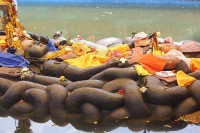Visit to Taudaha
Passing through the crowded city and the only public University in Nepal (Tribhuvan University) towards the cool forested hill, one could reach Taudaha. The pleasant lake and its quite environment make you forget the crowd of the city, the rustic old Himal Cement Factory and their unpleasant smell and environment.
It is said that the lake was formed after bodhisattva Manjhushree cleft the Chobhar gorge with his flaming sword. Locals believe that Taudaha is one of the only two ponds left behind when Manjushree carved through Chobhar and released the waters of the great lake of the Kathmandu valley. It is also said that Taudaha accommodates a huge snake Karkotak, King of the Nag (serpent). According to the myths, the walls of the serpent king’s submarine palace are studded with sapphires, rubies and other precious stones. The lake/pond observes massive gatherings of devotees during Nag Panchami and Rishi Panchami when they come to pay homage to the serpent-king.
However, according to the geologists, several lake outbursts drained the valley, the last about 10,000 years ago and the water from the lake (Kathmandu valley) drained through fissures in the Chobhar gorge. During the time, Taudaha was in the course of the Bagmati and it was only after the river left it stranded when it changed its course, Taudaha exists as an independent lake. Taudaha is a peaceful and the view it provides is purely meant for relaxation. There are small bamboo huts around the lake which were established as a resort and serve the culinary needs of the visitors. The wide lake with the backdrop of the green mountains and snowcapped white Himalayas are great for relaxing for mind and making you forget all your troubles. Numerous ducks float on the surface of the water and over 100 species of the birds have been recorded in the area among which 48 species are dependent on wetlands while some are wintering.
Swimming, boating and fishing on the lake are forbidden as the lake is considered to be sacred. Although the picnickers and the visitors tend to pollute the lake with the wastes, locals have made it their duty to raise awareness and preserve its natural and cultural significance.






